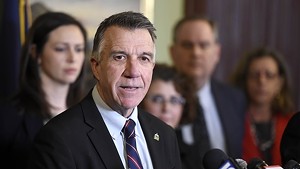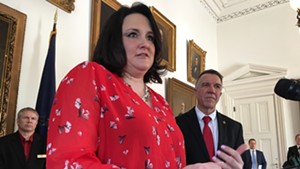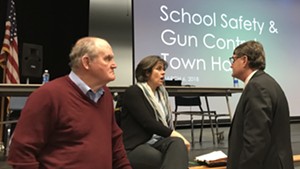
It's not often that politicians are honestly shaken by events. But it happened here in Vermont last Friday afternoon, when they learned just how close the state had come to a mass school shooting of its own. The day before, 18-year-old Jack Sawyer of Poultney had been detained and ordered held without bond. He told police he had planned to inflict carnage on students at Fair Haven Union High School and was still determined to do so if he ever got the chance.
Gov. Phil Scott presided over a Friday press conference at his office, where law enforcement officials recounted chilling details of the incident. Scott's voice came close to breaking at times. Reporters were taken aback, their questions uncharacteristically few.
As I walked from the Pavilion Building to the Statehouse, I ran into former state senator Dustin Degree, now a member of Scott's executive team. We exchanged a few words on the obvious subject, and Degree concluded, "It's a whole new world."
Indeed.
One day earlier, political leaders had gone through the awful routine of commenting on yet another school shooting, this one in Parkland, Fla.: thoughts and prayers, warnings against complacency, calls for action ... and the blasé pronouncements that Things Are Different in Vermont.
"We're fortunate we're one of the safest states in the country, and I believe our gun laws are balanced," Scott had told Seven Days' Taylor Dobbs on Thursday afternoon — after Parkland but before he learned of Fair Haven. The governor called for more training and drills in schools, a position that struck a sour note with many Vermonters.
The reframing began at the press conference the next day. "We don't want kids to be afraid to go to school," Scott said. "We don't want parents to be afraid to put them on the bus. We want to make sure we're doing everything we can to keep them safe."
And "everything" included the possibility of new gun laws, which Scott has adamantly opposed as governor. No specifics and no promises, but an openness to the idea as he called for an all-encompassing statewide conversation on every issue related to America's plague of mass shootings.
Over the weekend, lawmakers heard loud and clear — well, loud anyway — from their constituents. They returned to the Statehouse this week with the issue thrust to the forefront.
"We've put guns on the agenda for leadership meetings, caucuses, our meetings with the governor's staff and Senate leadership," said House Speaker Mitzi Johnson (D-South Hero). "People are energized and disturbed by how close to home this was."
There may be new legislation brought forward, even though the deadline for new bills has come and gone. "We could pull a bill off the wall and rework it. A committee bill can be introduced anytime," she said. "I'm compiling a list of suggestions from legislators and constituents," she added.
Will the talk turn into action? Right now, the Senate Judiciary Committee is ground zero for the issue; three gun bills are now before the five-member panel. The crucial vote on the committee is wielded by its powerful chair, Dick Sears (D-Bennington), who's something of a swing vote on gun issues.
Last year, the House passed H.422, which would require police to confiscate firearms from anyone arrested or cited for domestic assault. Senate Judiciary has not taken a vote on H.422 — or on S.6, a bill sponsored by Sen. Phil Baruth (D/P Chittenden), an outspoken gun control advocate, that would require universal background checks for firearms purchases.
Sears, along with committee members Joe Benning (R-Caledonia) and Alice Nitka (D-Windsor), insist that there's no point in passing S.6 because it wouldn't have prevented Fair Haven. "Look at mass shootings," said Benning. "The shooter passed background checks, bypassed the system or stole a gun."
Nitka pointed out that background checks are already in effect for sales through gun shops or registered dealers at gun shows. "I'm not so concerned about private-to-private sale," she said.
Perhaps she should reread a Seven Days column from June 2016, in which political editor Paul Heintz recounted his own experience with private sales. After googling "AR-15 Vermont," he found a local seller online and, within 24 hours, purchased such a gun for $500 cash in a strip-mall parking lot. The transaction was perfectly legal under Vermont law, no background check required.
An AR-15 semiautomatic weapon was used in the February 14 Florida shooting last Wednesday.
The bill most likely to pass Senate Judiciary is Sears' own S.221, which would create "extreme risk protection orders" against those deemed an imminent threat. Police could ask a judge to issue an order, which would prohibit the subject from possessing a firearm for up to one year. Orders could be sought for suspected shooters such as Sawyer and in cases of domestic violence or risk of suicide.
"Connecticut has a similar bill, and it's been working well," Sears noted. "In Connecticut, 61 percent of gun seizures were suicide risks."
Sears believes his bill is more comprehensive than the House bill because his allows seizure of weapons immediately after an arrest for domestic violence. This appears to be an exaggeration; Sears' bill would require police to obtain a court order before confiscating dangerous weapons, which is a difficult process.
But the House bill may be destined to languish, while Sears plans to get his own bill to the full Senate within 10 days.
The outlook for S.6, the background check bill, is more complicated. If brought to a committee vote, it would likely fail 3-2. Sears could switch sides and advance the bill, but he says he won't, and the Senate's leadership is not going to push him. President Pro Tempore Tim Ashe, a member of Judiciary who personally favors background checks, speaks of "respecting the committee process" and "trying to find a way the committee votes out a bill."
Don't expect Ashe to work around his chair. He became pro tem with Sears' full-throated support, and Ashe has shown little inclination to publicly challenge the body's senior members. But is there another way?
Of course there is. If Sears' bill reaches the Senate floor, any member could propose an amendment to tack universal background checks onto it. The only question is whether the full Senate would support such an amendment — particularly if the committee chair opposed it.
Could Sears be convinced to back such a procedural move? In a phone interview on Sunday, he implied a quid pro quo: Baruth chairs the Senate Education Committee, which is considering two bills backed by Sears, one on school discipline and one that would ban teacher strikes. Sears signaled that if Baruth's panel advances those two bills, he would support a floor vote on background checks.
Which must seem petty when students are being told to hide under their desks if a shooter starts blazing away.
So what will happen in the remainder of the session?
It's hard to imagine that lawmakers will adjourn without some kind of action. The most likely outcome is passage of something like S.221. There's a long-shot chance for universal background checks. A completely new bill could emerge.
But the political calculus really hasn't changed. Many lawmakers don't want to interfere with Vermont's tradition of gun ownership. The gun-rights lobby remains a potent force.
The X factor in all this is the governor. He is the one person who could, by himself, alter the status quo. His popularity and his gun-rights bona fides would make it easier for lawmakers to support gun legislation. But without his active participation, it may not be such a whole new world after all.
A True Outsider
Brad Peacock is everything your typical U.S. Senate candidate is not. He grew up in a poor family in southeastern Vermont and works as a farmhand in his hometown of Shaftsbury. At 37, he'd be one of the youngest people in Congress. He's gay, and there's never been an openly gay man in the Senate. (Tammy Baldwin (D-Wisc.) is the only openly lesbian senator.)* He's running as an independent.
And he claims a campaign bankroll of $500.
With all that going for him, Peacock aims to challenge the very popular Sen. Bernie Sanders (I-Vt.), who's universally expected to seek reelection this year.
"Quixotic" seems too mild a word.
Politically, Peacock claims to track "fairly closely" with Sanders. "He's a very progressive person. He's helped veterans a lot. He's an advocate for the poor," Peacock said. So why does he want to replace a living legend?
"I believe strongly in term limits. Twelve years is enough time in the Senate," he said. "Also, I believe that the people of Vermont deserve a full six years. If Bernie runs for president [in 2020], he will not be there for six years."
Peacock foresees a low-budget campaign relying on word of mouth and "kitchen table talks, where people open up their homes, share a meal and talk about the issues," he said.
Still, Peacock faces long odds at best. Why run?
"I think there's real value for an everyday person to run for office and to be heard," he said. "I've gotten a really strong reaction from people who say that's important and from young people who say, 'You've inspired me.'"
Peacock has a compelling personal story. His family often relied on public assistance when he was growing up. He enlisted in the U.S. Air Force in the late '90s, and there he realized he was gay. That got him bounced from the military. He returned to his hometown, where he works on Clear Brook Farm. His husband, James Crews, is a widely published poet.
Yep, he definitely brings a fresh perspective to the campaign.
Media Note
It didn't take long for Waterbury-based WDEV Radio to hire a new host for its midmorning call-in show. Just a few days after Mike Smith announced his departure, the station hired veteran journalist Dave Gram, whose first day on the air will be Monday.
The 61-year-old Gram spent 31 years covering Vermont for the Associated Press, before being laid off in January 2017 in a cost-cutting move. He's currently a part-time editor and reporter for VTDigger.org, and he's never hosted a radio show before. That didn't stop WDEV owner Steve Cormier from calling Gram "perfect" for the job.
But why did Gram decide to trade his keyboard for a microphone? "I felt kind of a need to turn the page," Gram said. "It'll be new things to learn and new ways to stay involved in the public life of Vermont, which I think will be really exciting."
Disclosure: Tim Ashe is the domestic partner of Seven Days publisher and coeditor Paula Routly. Find our conflict-of-interest policy at sevendaysvt.com/disclosure.
*Correction, February 21, 2018: An earlier version of this story misstated the name of the first openly lesbian U.S. Senator. It is Tammy Baldwin of Wisconsin.














Comments (7)
Showing 1-7 of 7
Comments are closed.
From 2014-2020, Seven Days allowed readers to comment on all stories posted on our website. While we've appreciated the suggestions and insights, right now Seven Days is prioritizing our core mission — producing high-quality, responsible local journalism — over moderating online debates between readers.
To criticize, correct or praise our reporting, please send us a letter to the editor or send us a tip. We’ll check it out and report the results.
Online comments may return when we have better tech tools for managing them. Thanks for reading.